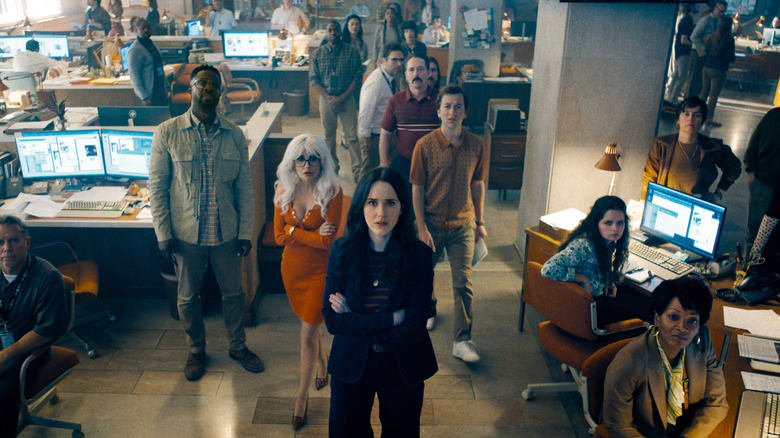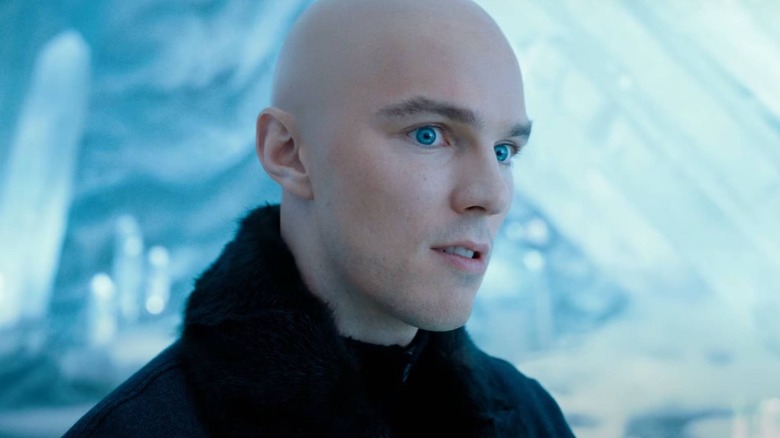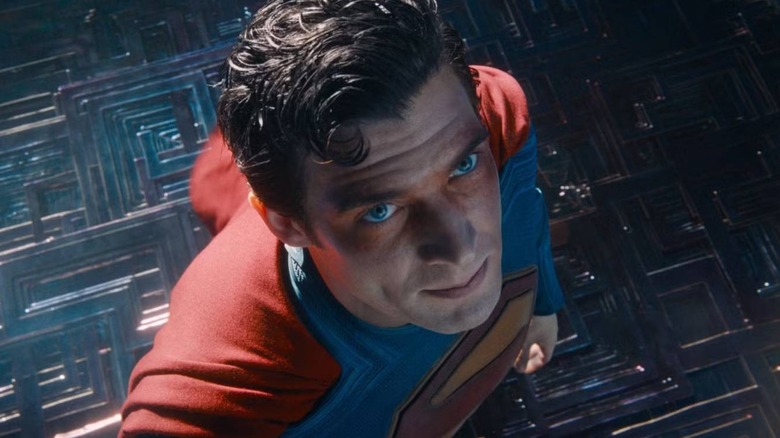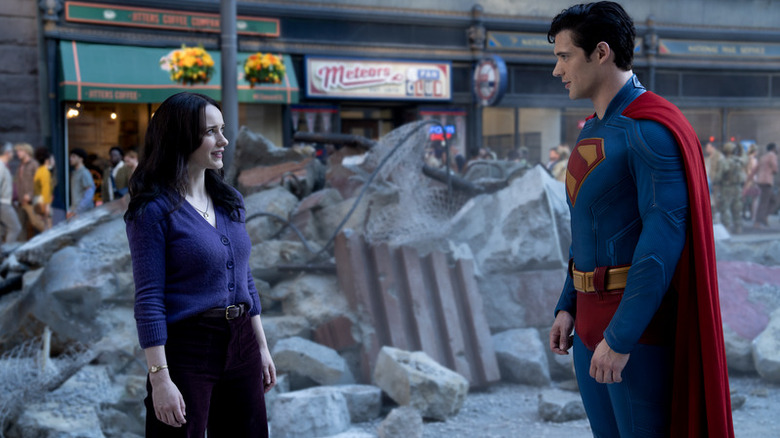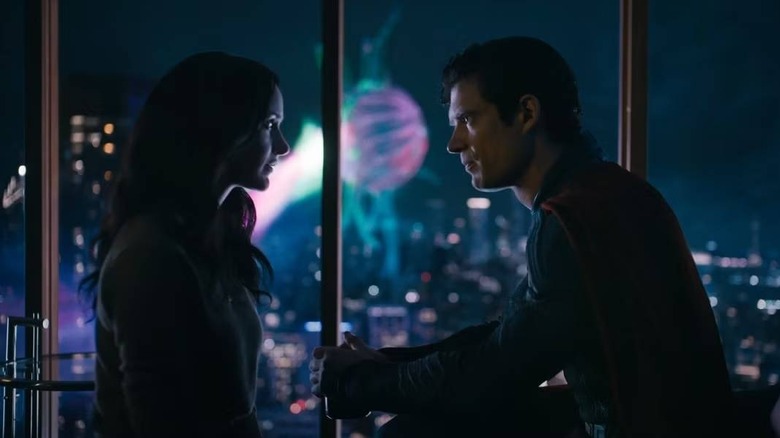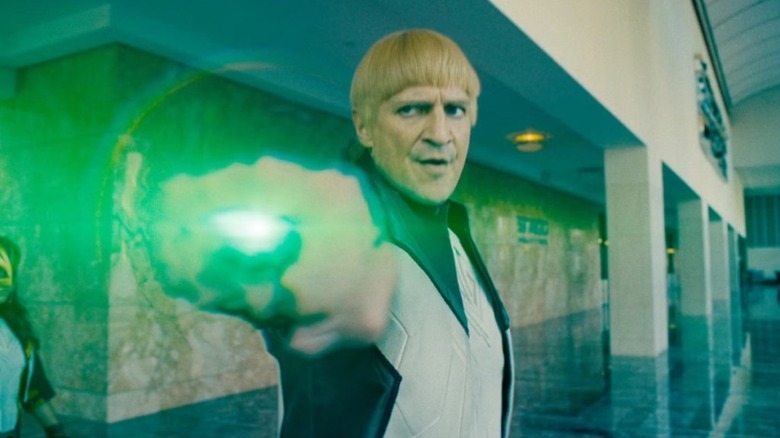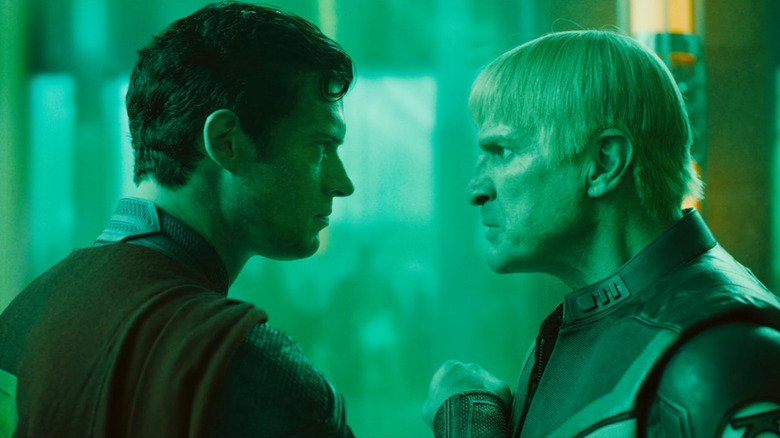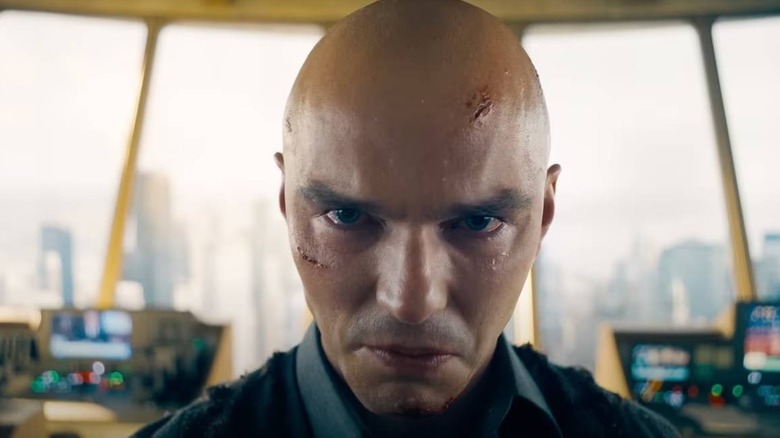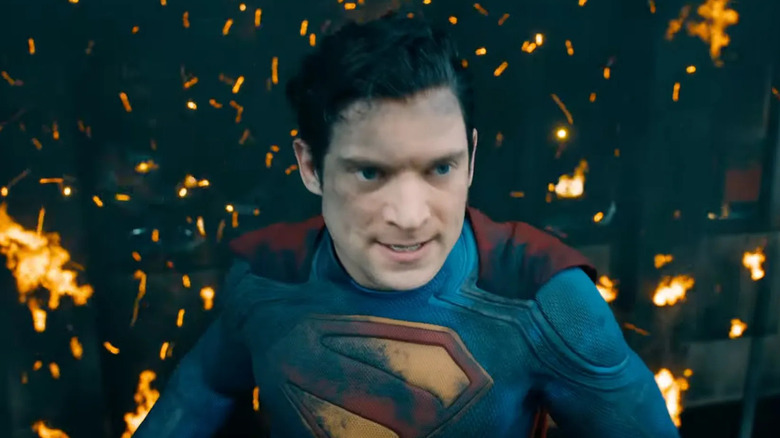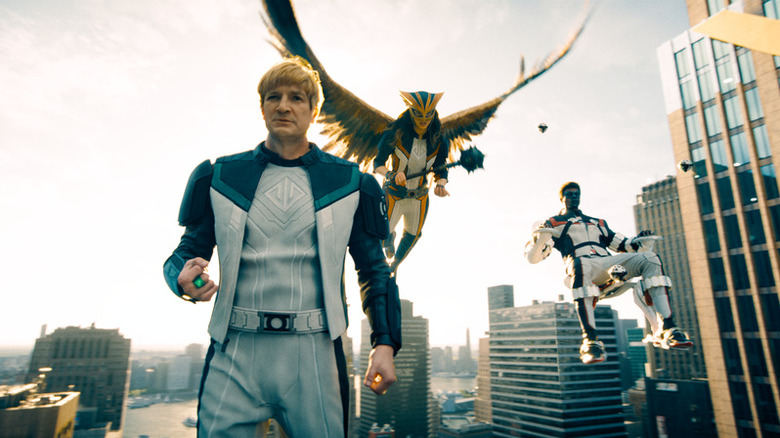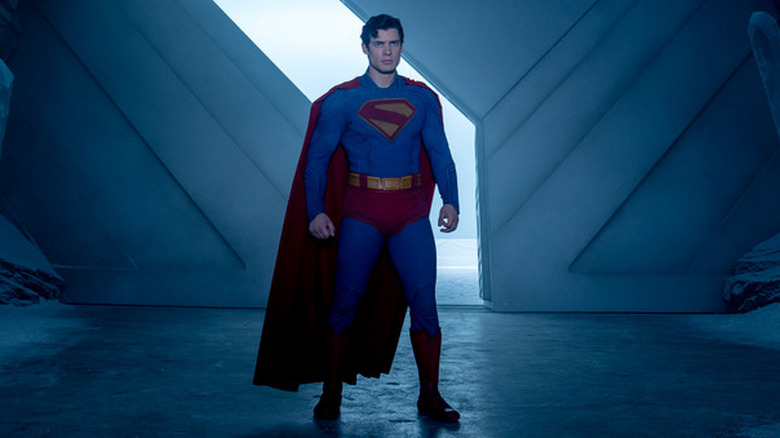Lines In James Gunn's Superman That Are More Important Than You Think
We may receive a commission on purchases made from links.
Contains spoilers for "Superman"
James Gunn's "Superman" isn't just another comic book movie, it's the start of a new era for DC superheroes on the screen. Gunn and Peter Safran, co-chairmen and co-CEOs of DC Studios, are now at the helm and are turning over a new page for the company following the decade-long, topsy-turvy run of the DC Extended Universe. Gunn and Safran's newly branded DC Universe technically began with the Max series "Creature Commandos" in 2024, the first installment in what they're calling Chapter One: Gods and Monsters, but "Superman" is the franchise's first silver screen offering. It has largely been met with praise: Looper's review of "Superman" calls it "zippy blockbuster fun."
Superman (David Corenswet) has been dealing with heroics for a few years when we catch up with him in the film. He finds himself in Lex Luthor's (Nicholas Hoult) crosshairs after he gets involved with international affairs. This Superman must navigate treacherous moral and political territory while letting the world at large know that he doesn't mean them harm, but it's not all just high-octane fights and kaiju battles. "Superman" knows when to take things slow and let the characters breathe, and if you know when to pay attention, you may have caught a line or two that seemed like it held greater significance. Some of these lines reference comic book lore while others set up DC movies to come, and they all result in a richer story.
There's none left on the planet
There's a curious line at the beginning of "Superman" where it's noted that there's no kryptonite left on Earth. This material is famously Superman's main weakness. Without access to it, Lex Luthor has to get creative to weaken the Man of Steel. That's why he has Metamorpho (Anthony Carrigan) incarcerated so that he can transform part of his body into kryptonite to weaken Superman. It's a creative workaround, for sure. However, it leaves viewers wondering what happened to all the kryptonite and what its absence means for the future of "Superman" movies.
The opening preamble states how Superman has been saving people for three years at this point. It's likely that, during that timespan, someone figured out that kryptonite hurt Superman, meaning there would be an incentive for him to get rid of it all. Perhaps he formulated some kind of plan to throw it all into space so that no future villains could use it against him.
Assuming "Superman" gets a proper sequel, what would villains use against him? Even Lex Luthor still needed it to stand a chance against him. Perhaps this will entice James Gunn (or whoever directs the next "Superman" film) to use one of Superman's strongest villains we haven't seen in a live-action film yet. Brainiac is more than a match for Superman without glowing green rocks, so maybe it's his time to shine.
Superman doesn't have time for selfies
During Superman's interview with Lois Lane (Rachel Brosnahan), he mentions how he "doesn't have time for selfies" and isn't on social media all that much to begin with. He then relents and mentions how he peeks every now and then, meaning he's aware of the vitriol lobbied against him by folks using #SuperSpy. It shows that even the Last Son of Krypton isn't immune to internet trolls, and it also sort of feels like a meta-commentary on writer-director James Gunn's own relationship with social media.
It's safe to say Gunn is chronically online, and it's not just to promote whatever project he has in the works. He's known for getting into debates with people and shooting down false rumors. He's not afraid to set the record straight on things like Matt Reeves' "The Batman" sequel when the false information gets out of hand. As the co-head of DC Studios, Gunn has an entire brand to protect now, so he's unlikely to quit social media anytime soon.
Maybe Superman's statement reflects how Gunn himself would like to treat social media. It's something we all like to think we can ignore, but ultimately, we can't help but see what complete strangers online are saying. At the end of the movie, Superman says he's human like anyone else because he makes mistakes, but he's also human because he can't help but care about what others think of him.
Secret harem
Lex Luthor de-scrambles the damaged component of the message that Superman's parents, Jor-El (Bradley Cooper) and Lara Lor-Van (Angela Sarafyan), sent with their son. While the first half sounds optimistic, with them telling Kal-El to be a protector of Earth, the second portion suggests they want him to rule over humanity. Part of this entails building a "harem" of women so he can have many children, and it's the point a lot of people seem focused on following the revelation. At first, it feels like Luthor tampered with the audio to change the message, but he insists that he didn't do anything, and there's no reason not to believe him at that moment.
This leads to a running joke about a "secret harem," which is fascinating in the context of how Kryptonian reproduction has been portrayed in previous "Superman" media. In the Syfy series "Krypton," for example, genesis chambers are used as opposed to traditional sexual intercourse. These allowed for reproduction without the need for any physical interaction. Jor-El and Lara conceived Kal-El naturally, going against this trend. We don't know much about the new film's versions of Jor-El and Lara because we only see their holograms. But it seems they wanted Kal-El to continue this trend rather than packing a genesis chamber into the spaceship with him to use later.
Dimensional imp
The first image of David Corenswet's Superman was met with complaints from some fans, mostly about the outfit itself. But there was also chatter about a giant orb outside of the window seemingly wreaking havoc on Metropolis while Clark Kent appears preoccupied with something else. This moment is actually in the finished film, with Clark referring to the entity as a "dimensional imp," and the reason he's not concerned is that the Justice Gang — consisting of Guy Gardner (Nathan Fillion), Hawkgirl (Isabela Merced), and Mister Terrific (Edi Gathegi) — are handling it.
The use of the word "imp" is interesting in this context since imps are technically seen as humanoid beings in DC Comics. They're effectively magical entities that can manipulate the fabric of reality, with some notable imps including Mister Mxyzptlk, one of the few comic book characters more powerful than Superman, and Bat-Mite. James Gunn has been very open about his fondness for Bat-Mite, even hinting that he might bring the character to the screen one day.
Could the "imp" reference be a nod to Bat-Mite's eventual introduction into the new DC Universe? It's possible, but again, the orb seems to be a different thing entirely rather than Bat-Mite or Mister Mxyzptlk. Perhaps it's an imp from a different dimension to the imps comic book fans are more familiar with. Or maybe Gunn just wanted to mess with the audience a bit.
He wears hypno glasses
After Superman gets captured by Lex Luthor, Lois Lane goes to the Justice Gang for help. Guy Gardner responds by being his usual jerky self, asking Lois if she knows about Superman's hypno glasses. She informs him that she does, and he reveals that they all know that he's Clark Kent. The hypno glasses point to an obscure bit of Superman lore where Clark's glasses make him look substantially different from Superman.
James Gunn revealed to ComicBook.com that he always had trouble reconciling that no one could recognize Clark and Kal-El are the same person. He said: "It's kind of been forgotten but [hypno glasses are] from the comics. I was sitting with Tom King, the comic book writer, and I was like, 'You know the thing that I just don't really know how to reconcile in myself is the glasses because the glasses always bothered me as a kid.' They bothered me because I just don't have that much suspension of disbelief to believe that." King then revealed the DC deep cut that Superman technically hypnotizes people, and it's now canon to the DC Universe.
This is a common complaint among people who aren't massively into Superman and know the lore inside out, so it's great to finally have an explanation for the fact that not a single person seems to cotton on to the fact that Clark Kent resembles Superman a little too closely. To his credit, Corenswet does a great job changing his mannerisms as Clark Kent compared to Superman, and there is a slight physical difference, especially in terms of the hairstyle. But with all the other weirdness in "Superman," hypno glasses are just another thing for hardcore comic book fans to enjoy.
I took a vow
Guy Gardner probably gets the most lines during Lois' trip to the Hall of Justice, for better or worse. It all fits with Gardner being the bad boy Green Lantern and not being as noble as the likes of Hal Jordan and John Stewart. Unlike Hawkgirl and Mister Terrific, whose backstories don't really come up, Guy at least mentions that he took a vow and references the Green Lantern Corps.
Like any Green Lantern, he would've needed to give the iconic oath: "In brightest day, in blackest night, no evil shall escape my sight. Let those who worship evil's might beware my power, Green Lantern's light!" Guy mentions a few other things during this meeting that don't really seem to be part of that oath, which probably indicates how he doesn't take his vow all that seriously.
This could make him an intriguing dramatic foil compared to other Green Lanterns. The HBO Green Lantern series will focus on Hal (Kyle Chandler) and John (Aaron Pierre), and it's been described as being in the vein of "True Detective." That makes it sound pretty serious, and it's possible those two won't want anything to do with Guy if he's so cavalier about his oath.
He wants to make himself king
Lois Lane and the team at The Daily Planet uncover Lex Luthor's ultimate plan. He's the one funding Boravia's invasion of Jarhanpur so that he can receive a portion of the country for himself to rule over as king. It's perfectly in line with the usual egomaniacal machinations of the supervillain, and Lex becoming a ruler has happened a couple of times before in the comics.
The story most will be familiar with is when Lex Luthor ran for president of the United States, beginning in "Superman: Lex 2000" #1 from Jeph Loeb, Tony Harris, and Ray Snyder. Luthor runs a successful campaign for the 2000 presidential election, but some things never change. He still has a vendetta against Superman, with his presidency unraveling as he continues trying to kill the Man of Steel. This storyline was also somewhat adapted in the "Justice League Unlimited" animated series where Lex runs for president to try to take down the Justice League.
Lex even becomes something of a king in a storyline starting with "Superman" #164 from Edmond Hamilton, Curt Swan, and George Klein. He uses his technology to improve the planet's irrigation systems. The people treat him like a king, building a statue of him and even renaming the world "Lexor" in his honor. In many stories, Lex isn't content with merely being a successful businessman; he wants to rule over others, and that's probably why he hates Superman so much. If he had that kind of power, he'd use it to subjugate humanity, so that's what he assumes Superman wants to do.
He might be even stupider than you
Superman learns that the Hammer of Boravia and Ultraman are one and the same and under the control of Lex Luthor. When the character loses his mask, it's revealed he's a clone of Superman, looking exactly like him, although Lex states that he's "even stupider than you," in reference to Clark.
Superman has had quite a few clones over the years, but this new one seems to be its own different thing. First, there's the name "Ultraman" itself. This is a reference to Ultraman from the comics, a version of Superman from another dimension who's the leader of the Crime Syndicate, an evil iteration of the Justice League. Bizarro is another Superman copy, hailing from Bizarro world and using backward-speak that could come across as "dumb," as Lex would probably put it. Even these aren't technically clones as they come from other worlds, so Superboy might be the closest to what Ultraman is in "Superman."
Superboy actually is a clone derived from Superman's DNA which has been combined with Lex Luthor's own genetic material. Superboy's more of a good guy though, so even he's not the best fit. Other clones include Cyborg Superman and Nuclear Man, the latter of which was introduced in "Superman IV: The Quest for Peace." James Gunn's version of Ultraman seems to be a new creation, taking from bits and pieces of other "Superman" media. He gets tossed into a black hole, and if that portal sends him to another dimension, maybe he could become warped and villainous in his own right. Seeing as Lex referred to him as stupid, he could come back as Bizarro in a future DC project.
Now they're the ones making the rules
"Superman" naturally has a happy ending, unless you're working on behalf of the United States government within the film's universe. Superman stops Lex's plan, negating the rift. He also gets Hawkgirl, Guy Gardner, and Metamorpho to resolve the conflict unfolding between Boravia and Jarhanpur since he has his hands full elsewhere. It's a change in pace for the Justice Gang, as they're more like corporate-sponsored heroes, so it seems like they went rogue to do what was right. This leads to a government official declaring, "Now they're the ones making the rules."
This seemingly indicates that the Justice League is a real possibility down the road. The film makes it clear that heroic metahumans typically operate under some kind of guidance, which makes Superman a thorn in officials' sides. He doesn't obey a corporation or a government, he just does what he believes to be right, and it seems that attitude has influenced other metahumans to forge their own paths.
The government being scared of the Justice League is a recurring plot point in the "Justice League Unlimited" cartoon, leading to the development of Project Cadmus to counter metahuman activity. "Superman" deals heavily in political issues, and with more metahumans doing what they see fit rather than what they're told, there's a good chance that future DC movies will delve into government plans to crack down on independent heroes.
She likes to go party on other planets
"Superman" ends with a tease of DC Studios' next film: "Supergirl." Kara Zor-El (Milly Alcock) unexpectedly arrives in the Fortress of Solitude to pick up her dog, Krypto, with us learning that her being off-world is the reason Superman has had to foster the pup. She's back now and ready to take Krypto to her next outing, with Kal-El telling his robots, "She likes to go party on other planets," specifically ones with red suns that dampen her Kryptonian durability so that she can actually get drunk. Superman's exposition sets up what will likely be the inciting incident of the upcoming "Supergirl" movie, which will draw influence from the "Supergirl: Woman of Tomorrow" comic from Tom King and Bilquis Evely.
"Woman of Tomorrow" begins with Supergirl getting drunk on another world when she's approached by Ruthye Marye Knoll (to be played by Eve Ridley), who wants help tracking down Krem of the Yellow Hills (Matthias Schoenaerts) so she can avenge her father's death. James Gunn has already promised a much harsher version of Supergirl for her upcoming film, and that's readily apparent from her quick cameo in "Superman." This is a Supergirl who's rougher around the edges, and it's exciting to see that the DC Universe is jumping right into the more cosmic side of this franchise so soon.
